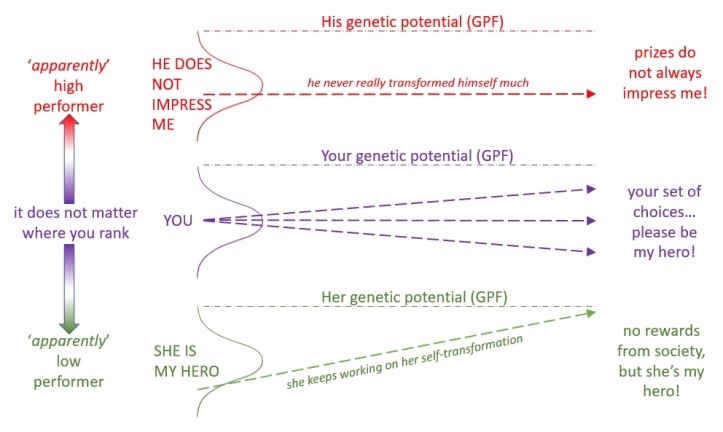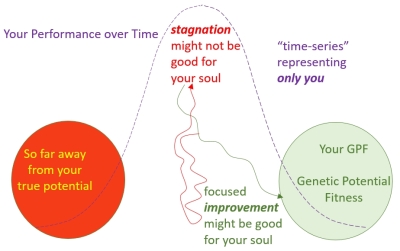
Happiness warning: This conversation pertains to all aspects of your life, not just physical fitness.
It has been a while since I chatted with you about Why I don’t care about your Podium Finish (or Mine). Since then it has been one of my most widely read articles. Those who know me well, know that I am extremely competitive, but I would like to think they have always thought it to be an appropriately targeted style of competitive spirit. At the same time, one of the terms and conditions I set in place early when I mentor anyone is “you will not compare your performance (e.g. running times) or attributes (e.g. body fat %) with that of any other person”. So, if that’s the case, do I think it is good for you to compete? Yes. And, do I think it is good for you to compare? Yes. So then, is there a catch? What is the framework within which competing and comparing can be life-enhancing?
Roadmap
I will speak swiftly about competing, comparing, benchmarking, competition and control, and then make recommendations around compassion, detachment and improvement. In a few minutes, I hope you will have a happier and clearer path to follow.
Contents
Level of Difficulty
Comparing & Happiness Science
Comparing and Competing
GPF – Genetic Potential Fitness
Benchmarking vs The Competition
Cross-sectional vs Time-series
Control
Comparing Happily
Competing Happily
Conditioning for Happiness
Performance Attribution
Inward Looking is Forward Looking
Making Outward Looking also Forward Looking
Interested in Outcome, Unemotional about Result
Level of Difficulty [top]
Researchers in the area of happiness and social psychology have demonstrated that in order to enjoy an activity and derive happiness from it, the level of difficulty has to be just slightly higher than what you are currently capable of. Have you noticed that when you take up something like badminton or squash, those who are a lot better than you do not really want to play against you if they can help it? Or have you noticed how you do not want to always train for a race with someone who is much slower than you?
Comparing & Happiness Science [top]

Researchers have also shown that comparing yourself with others does not lead to truly sustainable happiness. Comparisons with those much better than us can be demoralizing. Comparisons with those much worse than us can lead to arrogance. At the same time, comparisons are inherent to the survival of living things. Even single-cell organisms compare the immediate environment to what is ideal for their proliferation to decide what their next move should be.
Comparing and Competing [top]
So, if you are to compete, and you are to compare, then how do you do this in a way that leads to greater happiness and fulfilment? You probably know the answer to this already having heard it often – and even in my previous article. Do not compare with and compete against others, compare with and compete against yourself. Now, let us examine this more closely and try to understand why it works.
GPF – Genetic Potential Fitness [top]

In Why I don’t care about your Podium Finish I had described how the very slow lady who was getting faster was developing herself as a person, whereas the complacent lady with better genes for that domain who was winning races was, perhaps, not. It was in this earlier news article that I first publicly mentioned what I call GPF or Genetic Potential Fitness. Although, at first sight it appears that I am talking about physical fitness, in fact, I think of this as being applicable to any domain of your life that interests you. From running to sleep (yes, you can train yourself to sleep in the best way possible), from body strength to singing (do you know someone who has a lovely voice but never makes it to a performance stage because they are too lazy to practice?), from calisthenics to cooking (isn’t it amazing to come across a teenager who can knock your socks off with an amazing dessert?).
You and I both have immense potential in each of the areas of life that interests us but we rarely get close to that potential. We allow ourselves to wallow in the middle of our abilities, far from our genetic potential.
Benchmarking vs The Competition [top]
Once we leave school and college education, unless we are professional athletes most of us have no formal competitive benchmark placed before us to beat. Sure, a sales professional has to beat his competitor’s sales in the next quarter, a housewife feels the pressure to cook her husband’s favourite dish better than his mother does, and a fund investment manager attempts to beat the industry benchmark agreed with her client. The rest of us tend to find some path through the various constraints we face while trying to produce better results, whether in the kitchen, office, boardroom or bedroom.
Cross-sectional vs Time-series [top]

When we compare with others we are typically doing a “cross-sectional comparison” – an observation of many people at a given point in time. Although that has value in some settings, and perhaps can even be one form of short-term motivation, I prefer to think of “time-series comparisons” where I am the only subject in the data set and observe progression through time. Why do I do this and what is the special strategic advantage in doing this?
Control [top]

Whenever we announce the result of some study, typically of an activity and its effect, there is always the implied question “what control group did you use as a benchmark?”. Unless you can study yourself along with clones of yourself for a cross-sectional self-study, it is really not possible to fully and precisely understand the effect of an activity on only you as a specific individual – be it the effect of regular exercise on your health, giving up sweetened drinks, or the introduction of meditation into your life. However, you can do something almost equivalent to that in a manner that will lead to greater happiness.
Although you can’t do a cross-sectional comparative study of you with your clones, you can do a time-series study of yourself. The DNA is held fixed at least! Besides keeping track of your actions (the ‘process’), we can also keep track of your outcomes (the ‘goals’) over time.
Comparing Happily [top]
The beauty of this approach of ‘self-comparison’ is that if you approach the dimension being pursued (e.g. your speed with Sudoku) with ‘self-compassion‘ (which, incidentally, is the other attribute that increases happiness) there is unlikely to be jealousy or even envy. After all, when was the last time you were jealous of your recent self? So, comparing with yourself will not produce negative happiness outcomes. (Of course, we might all look back much further with nostalgia or yearning at our more youthful days.)
Competing Happily [top]
If you set your personal targets wisely to be just slightly better than what you think you are currently capable of, then the competition is also healthy! Often, we set unrealistic targets and then are not happy with the outcomes. Perhaps, one day soon I will speak about target-setting specifically.
Conditioning for Happiness [top]
Whenever we have an outcome that is better or worse than what we hoped for, we can explain the difference between what we expected and what transpired with some obvious factors. And, often some of the difference remains unaccounted for given the information we possess. [I did something along those lines at a population level when I made this assertion.]
Now, think about the following – when you compare with others in daily life, you really have no clue about all the factors that lead to their performance. (You almost always don’t know what constraints or opportunities the other person had.) So, then, the comparison with them leads to very little value add to yourself. When you compare against your own (recent or distant) past, however, you have so much more information and there can be a lot more value captured (in the form of actual learning and progress, or even plain-and-simple ‘satisfaction’).
Performance Attribution [top]
If you record information about yourself then understanding why your performance was better or worse than expected is easy to do in a dispassionate manner. The more information and the richer the information you record, the more you will be able to understand yourself, your processes and your performances. For example, “I swam slower today because of a slight cold and blocked nose”. The positive feedback loop also serves as a wonderful tool for self-motivation.
Inward Looking is Forward Looking [top]
A key distinction between comparing and competing with others rather than with yourself is that of the target view being outward versus inward. The more you look inward, with or without explicit recording of data, the less you will find the need to be emotionally affected by the performance of others. Never mind what everyone else is up to, focus on your own growth towards being a more intelligent soul. The more you try to improve by controlling yourself, the less you will find the need to control other people or events [a surefire way of being unhappy in the short, medium and long run].
Making Outward Looking also Forward Looking [top]
When you are observing others, make it about process observation along with performance observation. Observe the changes in process that lead to differences in performance for that person. That will allow you to learn without comparing yourself with that person – you are comparing that person with that same person for your own self-improvement! There is, however, no competition with that person!
Interested in Outcome, Unemotional about Result [top]
When you work hard, you are interested in the result. However, it is important to develop a habit of being unemotional about the result that transpires- you are not your result. This form of ‘detached attachment’ is good yogic wisdom and can be made easier if you can attribute your performance to various documented factors, and attribute the (tiny) balance i.e. what you cannot explain to ‘luck’ or ‘chance’. Perhaps data can help you transcend!
I wish you happy comparing and happy competing for your personal growth and fulfillment!
Dr Purnendu Nath spends his waking hours focusing on helping individuals and organizations reach their goals, to make the world a better place. He speaks, writes and advises on topics such as finance, investment management, discipline, education, self-improvement, exercise, nutrition, health and fitness, leadership and parenting.


This is a very rational way of looking at improvements. You put into words what I am experiencing myself – a detached view of results and focussing on the process instead on the performance for happiness.
LikeLike
Dear Sameer
I am so glad to hear you are doing that. Great!
Best wishes!
Puru
LikeLike
Brilliant as always dada. Resonated so much with my own belief on why to compare against others whom we think have successed well in something. As we may not know the gamut of circumstances that transpired that person to achieve that feat. You inspire me a lot and i surely want to know my GPF and work with joy and passion towards it.
LikeLike
Dear Prem
Thanks for the kind words. And, one day, I will write in more depth about what I call GPF.
Here’s to a strong back!
Cheers!
Puru-Da
LikeLike
A good way of expressing the existential dilemma Puru. The “cross sectional vs time series” can be innately difficult to conceive given the social and individual conditioning (all literature widely available about tapping into the inner self and inner focus notwithstanding). A ‘Truth Analysis’ roadmap presented in empirical overtones (such as what you have attempted) and driving a shift in focus could help in addressing an abstract concept, render it less daunting and more adaptable.
It took me more than 7 minutes to go through it though, because the visual representations made me linger. No complaints. This deserves an unhurried visit. Enjoyed the read. 🙂
LikeLike
Dear Vani, my SiC
Thanks for your comment. I did take almost 7 mins to read it 🙂
Cheers!
Puru
LikeLike
Dear Puru,
we are always looking fwd to ur post on diff subjects but related to running theme also. though had to re read ur article 2-3 times to fully appreciate it but it was worth the efforts.
Hats off to you Sir and you are one of those who truly maintain work life happiness balance.
Hope to see u at SPBM on 15 Oct 17 at Bangalore.
Txs
LikeLike
Nice one . It takes a lot of time for someone to look inward and move . Amygdalae are crazy organs . Running or in life any thing measurable need not make you happy and vice versa . I see portfolio runners all around .
LikeLike
Dear Puru,
Greatly enjoyed reading your article. As usual, very well articulated!
My views:-
While I agree that “personal best” is a term that needs introspection and self-compared with the previous personal best, but human life is extremely complex and comparison actually kills one’s own individuality, which is what happens in our education system which is centered around grades and marks. Therefore , setting a measurable goal, maybe that is not achievable(very high goals), but is aligned with one’s own interest and abilities and unique personality, maybe a good motivator for one to start focusing and working towards it. Yes, the steps for reaching there will be the smaller goals which are just beyond comfort zone, so that he/she gets the low hanging fruits and builds achievement habits. Each individual is unique and different and so are the dimensions for measurement, so for example the IQ measurement used in the industry today may be totally incorrect and inconsistent. As how can you call someone who is illogical and chaotic by nature for eg MF Hussain, the abstract painter, as a Low IQ person. The dimensions for measuring the potential of such a person will be very different. So while measurement is important, but the dimensions and scales may be so variant that the key is in individualisation and personalised attention to each individual and design the goals and plans to achieve those goals also in a unique manner.
LikeLike
[…] When I first had an IQ test about 30 years ago two things became clear to me around that time. One was bad news, the other good. The first was that deterioration was guaranteed (bad news) but the second was that the rate of deterioration was significantly under my control (good news). From that time on, just being smarter than over 99% of the population in a very narrow dimension of existence was not what was all important for me. My own performance relative to myself is what matters. I made direct reference to this when I spoke to you about what you could do regarding Competing and Comparing, Targeting Happiness Maximization. […]
LikeLike
[…] Tweak as needed [read Competing & Comparing – Targeting Happiness Maximization] […]
LikeLike
[…] have said this many times already, you are in competition with no one else. [Read about Competing, Comparing & Maximizing Your Happiness.] Your focus is to be better than you were yesterday. [Read about your Genetic Potential Fitness.] […]
LikeLike
[…] be your favourite sport, you will often have to deal with training or competing under tough external and internal conditions. How might you think and plan to get the most favoured […]
LikeLike
[…] Message? It is not about what you do, it is about your attitude towards it. It is not about competing against others; it is about you being aware of where you are relative to your own […]
LikeLike
[…] Read: Competing & Comparing – Targetting Happiness Maximization […]
LikeLike
[…] Here is a simple and powerful framework I work with that almost guarantees you a long and happy […]
LikeLike
[…] Just don’t! Unless it’s required for your profession i.e. you cannot put bread on the table unless you are better than others at that specific task. [see: Competing & Comparing – Targetting Happiness Maximization] […]
LikeLike
[…] must assume that I was appropriately prepared for it. It is extremely important that you chalk out your own path based on your conditioning on the day – do not be in a rush – when unsure, always do less, not more! […]
LikeLike
[…] have an awesome life if you execute my proposal. [top] Of a happier and more fulfilling life… Everyone has a different measure of external success – money, power, fame. Developing an internal culture of keeping a rough […]
LikeLike
[…] See: Competing & Comparing – Targeting Happiness Maximization. […]
LikeLike
[…] in articles from Discipline to Fatigue. From Alcohol to Paneer. From appropriate ways to deal with Competing and Comparing to the pointlessness of our Podium Finishes. The fact that You Need Not Run if you understand what […]
LikeLike
[…] Competing & Comparing – Targeting Happiness Maximization Percentile based Rewards […]
LikeLike
[…] wholesome and sustainable motivator. When disparaging (y)our podium finish and later discussing competition and happiness I nudged you in the direction of being aware of your competition but focusing more on your own […]
LikeLike
[…] is fueled by people watching the world outside themselves on screens, followed by feelings of jealousy, or being filled with fear towards that stranger on the road. What is clear is that mindlessly […]
LikeLike
[…] genetic potential places an upper limit on your speed relative to your friends, so it is literally pointless to compare your speed with theirs. It is only essential that you improve relative to […]
LikeLike
[…] all other creatures, subject to the Unholy Trinity, I seek to maximise the total pleasure across my entire lifetime and minimize the pain i.e., negative […]
LikeLike